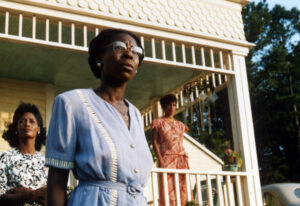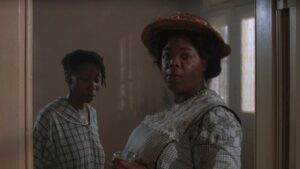The Color Purple (1985) review
Dir. Steven Spielberg
By: Steve Pulaski
Rating: ★★★
It might seem crazy to think that at 39-years-old, after having made Jaws, Close Encounters of the Third Kind, and Raiders of the Lost Ark, Steven Spielberg was still fighting for respect amongst critics and audiences. In the mid-1980s, his proclivity for serialized action and films firmly rooted in genre — as the “blockbuster” was still being birthed with each passing summer success — was undeniable, but some wondered if one of the youngest men to be crowned “the King of Hollywood” had a second gear. Could he downshift, so to speak, cut out the chase montages, and make a film more dramatic and human?
Then came The Color Purple, an adaptation of Alice Walker’s Pulitzer Prize-winning novel, in 1985. Spielberg was an unconventional choice to direct a story about the brutal experiences enduring by a young African-American woman in the early 1900s, so much so that Walker, who was heavily involved in production, wasn’t so sure he would be the right person to tell this kind of story. 2023 is a very different world than 1985, and no doubt that in today’s daily outrage climate, news of Spielberg directing a story of this caliber would be met with intense scrutiny from everyone from celebrities to YouTuber hot-takers.
Spielberg’s The Color Purple is a successful film. A good, not great, heel-turn for a director who proved he could tackle drama with the same prowess he demonstrated in the action-adventure genre. It might not penetrate as deeply nor as complexly as Walker’s source material, but the story is gives us is painful and memorable. The film is the story of Celie Harris, who grows up in Hartwell, Georgia in the 20th century. The film opens with her giving birth to the second child of her father (Leonard Jackson), who cruelly rapes and abuses her throughout her prepubescents and adult life. When she’s deemed unfit for more breeding, she is given to an equally brutal farmer named Mister (Danny Glover), who uses her for servant work and persistently reminds her that she is an ugly, vile creature.
The morsel of beauty in Celie’s life is the bond she shares with her sister, Nettie (Akosua Busia). But soon, Mister throws Nettie out of his house too, but not before Nettie promises Celie that only death would keep her from writing.

That separation forces Celie to grow up without a friend or lifeline in such a hostile environment. Years later, focus shifts onto Mister’s son, Harpo (Willard Pugh), who brings home a woman named Sofia (Oprah Winfrey), who is confident, boisterous, and doesn’t much care for Mister’s demeaning treatment of women. Sofia gives Harpo a choice: her or Mister, but Harpo is so accustomed to making everyone in his life happy that he is faced with an impossible quandary. The other significant character is Shug Avery (Margaret Avery), a jazz singer who Mister loves dearly. She arrives at his home one night, terribly sick and fatigued. Her first words to Celie are bitterly cruel — “You sho’ is ugly” — but eventually she does display a vague sense of kindness to the battered, broken woman that even gives her the slightest glimmer that her future might not be so bleak.
The grown-up Celie is played by Whoopi Goldberg in her breakout role. Celie is very much a work in progress throughout the whole film. How could she not be, with the life she’s lived? There are questionable moments, such as when she advises Harpo to beat Sofia in order to make her a more submissive partner. However, Goldberg is downright impressive at times with her reactive facial expressions, sometimes leaving certain scenes up to her eyes to do the emotional heavy-lifting.
While everything from the production’s heavily saturated colors to its admittedly grating score (by the usually strong Quincy Jones) do everything in their power to milk this story of its mawkishness, Spielberg thoughtfully avoids making this an explicit work of misery porn. The beatings, the raping, and the violence towards Black women are all a part of this story, but these moments aren’t given centerstage for very long. I don’t see this as a move for protection of the audience; I see their relative minimization as a way of keeping the characters and their continued growth and development a focal point of the story. One of the best scenes in The Color Purple involves Oprah Winfrey’s Sofia punching the mayor after he slaps her across the face. The seeds of an all-out brawl are planted, but the altercation ends with Sofia being jailed and her ordered by a judge to become a house-maid. Early in the film, systematic oppression is discussed between Celie and Nettie regarding its involvement in the narrative of Oliver Twist, the book they are reading. This idea comes back around in the way the once-strong and confident Sofia is rendered submissive by a system that never gave her a fighting chance in the first place.
Spielberg’s tendency to dial up the sentimentality and underscore the melodrama does make The Color Purple feel like a showcase of excellent performances within a film somewhat limited by its desire to drown out these great showings with noise. In the midst of some of the more intense criticism Spielberg’s film faces in the modern day — a lot of it due to society’s newfound pleasure of being offended and taken aback by the way things used to be — let it be known that the man with the proverbial key to Hollywood at the time opted to make a film about society’s problematic treatment of Black women. Regardless of some of its lesser elements, the heart of the material remains pure and good.
NOTE: As of this writing, The Color Purple is available to stream on Max.
My review of The Color Purple (2023)
Starring: Whoopi Goldberg, Danny Glover, Oprah Winfrey, Margaret Avery, Akosua Busia, Adolph Caesar, Willard Pugh, Laurence Fishburne, and Leonard Jackson. Directed by: Steven Spielberg.
About Steve Pulaski
Steve Pulaski has been reviewing movies since 2009 for a barrage of different outlets. He graduated North Central College in 2018 and currently works as an on-air radio personality. He also hosts a weekly movie podcast called "Sleepless with Steve," dedicated to film and the film industry, on his YouTube channel. In addition to writing, he's a die-hard Chicago Bears fan and has two cats, appropriately named Siskel and Ebert!


